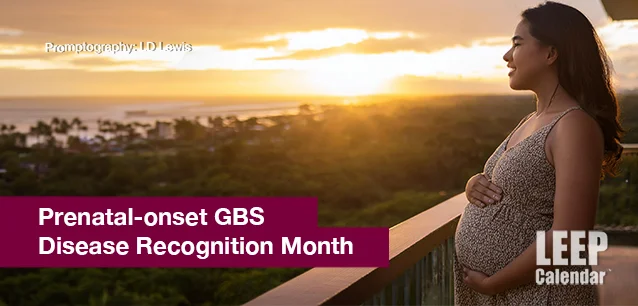 AD
AD
Today is: November 21
Scroll to explore events active on this date.
Additional Events on LEEP
LEEP INK FEATURES

August is Appropos
A toddler playing in the fountain at a park in Santa Fe, New Mexico—Photo LD Lewis. In August, we live through the Dog Days of Summer. It's hot and often humid, and those ...

September is Sassy
Can you hear that sigh of relief from parents worldwide? Yes! September marks the return of students to school, a global phenomenon. Preparations for the ACT and SATs begin earnestly for ...

OOH LA LA, October
October is the busiest month for events, with 5% more happening than in May, the second most eventful month. Sailing enthusiasts will be glued to the finals of this year's Am...
About Prenatal-onset GBS Disease Recognition Month
Women , United States
Ends: Oct 31, 2025
DESCRIPTION:
RAISING AWARENESS FOR NEWBORN HEALTH:
PRENATAL-ONSET GBS DISEASE RECOGNITION MONTH
Prenatal-onset GBS Disease Recognition Month, observed annually in October, is dedicated to raising awareness about Group B Streptococcus (GBS) disease, a serious bacterial infection that can affect newborns before, during, or shortly after birth. The month-long campaign aims to educate expectant mothers, healthcare providers, and the public about the risks of GBS and the importance of early detection and prevention to protect the health of newborns.
Group B Streptococcus is a type of bacteria commonly found in the intestines, rectum, and vagina. While it is often harmless in adults, GBS can cause severe infections in newborns, leading to complications such as pneumonia, meningitis, and sepsis. Prenatal-onset GBS disease refers to infections before birth, usually when the bacteria are transmitted from the mother to the baby during pregnancy or labor.
The Group B Strep International (GBSI), a nonprofit organization dedicated to preventing GBS disease in babies, is behind the establishment of Prenatal-onset GBS Disease Recognition Month. Their initiative was launched to increase awareness and promote prevention strategies, including routine screening of pregnant women and administering antibiotics during labor to reduce the risk of transmission.
SIGNS AND RISKS
GBS disease can present with a range of symptoms in newborns, depending on the timing and severity of the infection. Early signs of GBS infection in babies may include fever, difficulty feeding, irritability, lethargy, and respiratory distress. If not promptly treated, GBS can lead to life-threatening conditions, making early detection and intervention critical.
For pregnant women, GBS is a significant concern because the bacteria can be asymptomatic, meaning they may not know they are carriers. Approximately one in four pregnant women carry GBS, making screening and preventive measures essential. Without proper intervention, there is a risk of passing the bacteria to the baby during childbirth, leading to serious health complications.
THE IMPORTANCE OF PREVENTION
Prenatal-onset GBS Disease Recognition Month is a vital platform for disseminating information about GBS, including the importance of routine prenatal care and GBS screening. Healthcare providers play a key role in identifying GBS carriers and implementing preventive measures, such as administering antibiotics during labor to reduce the risk of newborn infection.
The campaign also emphasizes the need for ongoing research and education to improve outcomes for mothers and babies. By raising awareness and promoting best practices in prenatal care, Prenatal-onset GBS Disease Recognition Month aims to reduce the incidence of GBS disease and ensure that every baby has the best possible start.
Since its inception, this awareness month has helped bring attention to the importance of maternal and newborn health, empowering women to take proactive steps to protect themselves and their babies from the risks associated with GBS.
VIDEOS
SUPPORTING DOCUMENTS
Currently, this event does not have supporting documents.
ADDITIONAL IMAGES
Currently, this event does not have supporting images.
Where would you like to go now?
 AD
AD


/footer-logo.svg)
